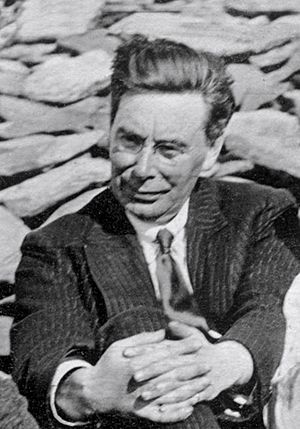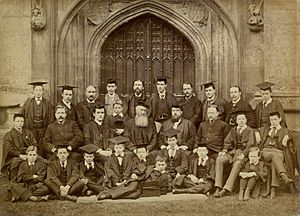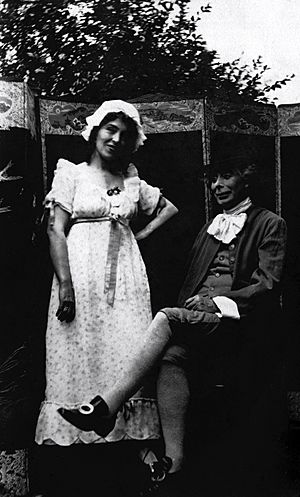Arthur Foxton Ferguson facts for kids
Quick facts for kids
Arthur Foxton Ferguson
|
|
|---|---|

Arthur Foxton Ferguson, baritone
|
|
| Background information | |
| Born | 3 January 1866 Leeds, Yorkshire, Great Britain |
| Died | 2 November 1920 (aged 54) Exmouth, Devonshire, Great Britain |
| Genres | classical and folk |
| Instruments | baritone |
| Years active | 1885–1920 |
| Associated acts | The Folk-Song Quartet |
Arthur Foxton Ferguson (born January 3, 1866 – died November 2, 1920) was an English baritone singer, teacher, and German translator. He lived in the early 1900s and is best known for starting The Folk-Song Quartet.
Contents
Life and Education
Arthur Foxton Ferguson was born in Leeds, Yorkshire, England, on January 3, 1866. His parents were Emma and William Ferguson. William was a bank manager. Arthur had six brothers and sisters.
He went to Coatham School and then Leeds Grammar School. In 1880, he attended Sedbergh School. There, he helped organize the school library. In 1885, Foxton Ferguson went to New College, Oxford. Later, in 1887, he earned a special scholarship at Magdalen College, Oxford to sing bass. He received his B.A. degree in 1890. It was unusual to switch colleges back then, but he was allowed because of his singing talent.
On October 26, 1897, he married Susanne Alexandrine Delphine Engel. She was a German pianist from Hamburg who had studied at the Hamburg Conservatory. She later moved to Scarborough, where she met Foxton Ferguson.
Vocal Training and Repertoire
We don't know much about Foxton Ferguson's early singing lessons. He probably learned a lot in school music programs and choirs. At Magdalen College, he sang with the famous organist John Varley Roberts. Foxton Ferguson's solo singing skills became clear during his college years. He even performed with a group called the "Magdalen Vagabonds."
After university, he studied music in London and then in Leipzig, Germany. He also learned from the well-known German baritone Julius Stockhausen. Stockhausen taught many types of music, including opera, oratorio (like a play set to music), and German Lieder (songs). Foxton Ferguson sang a similar wide range of music.
Even though he sang bass in groups, he was called a baritone when he sang by himself. His concerts often featured Lieder by famous composers like Schubert and Schumann. He also sang folk songs and new pieces by English composers. He performed in operas like Mozart's Le nozze di Figaro and Wagner's Die Meistersinger von Nürnberg. However, concerts were a bigger part of his career than opera.
Career
Foxton Ferguson is well-known for translating German texts into English. These included songs by Ralph Vaughan Williams and Charles Macpherson.
He often worked with other important musicians like Lucy Broadwood, Ernest Walker, Ralph Vaughan Williams, and Sir Henry Walford Davies. From 1905 to 1909, he collected folk songs with Broadwood and the English Folk Dance and Song Society. He was a member of this society for ten years. For example, he wrote down the "May Day Carol" after hearing Mr. Charles Baldock sing it in 1905.
In 1903, Foxton Ferguson was the first to sing three duets by Vaughan Williams. These songs were based on German folk songs that Ferguson himself had translated. He also sang Vaughan Williams's songs "Blackmwore by the Stour" and "Boy Johnny." In 1904, he and soprano Beatrice Spencer were the first to perform Vaughan Williams's Two Vocal Duets.
Before World War I, Foxton Ferguson performed in "Concerts for the Young" led by conductor Gwynne Kimpton. He sang children's rhymes and other songs. In 1914, he also gave a concert at Columbia University in the United States.
The Folk-Song Quartet
The Folk-Song Quartet was Foxton Ferguson's idea. The group included Beatrice Spencer (soprano), Florence Christie (mezzo-soprano), Louis Godfrey (tenor), and Foxton Ferguson (bass). They sang songs from England, Scotland, Ireland, and Wales. The quartet was very popular and performed a lot in England in the early 1900s. In 1907, they even went on a tour to Germany, starting in Hamburg and going to Berlin. People there loved their music.
Background: Foxton Ferguson formed a vocal quartet in London in 1901. His goals were to have a skilled group ready to perform Beethoven's Choral Symphony and to explore other quartet music. Early members included Austrian soprano Miss Marie Fillunger and Ernest Walker as the accompanist. By 1904, the group was regularly called the "Folk-Song Quartet." Beatrice Spencer became the soprano, and this group stayed together for about fifteen years.
Lectures and Teaching
Foxton Ferguson was known for being funny and lively on stage. He was an expert at giving talks about English folk songs. He would speak and sing during his presentations. He gave lectures in England, Germany, and on many tours across the United States between 1909 and 1914.
He often spoke at colleges, libraries, and women's clubs. Some places he lectured included Harvard University, the Brooklyn Institute of Arts and Sciences, and the University of Minnesota. His talks covered topics like folk stories, folk songs, Christmas carols, and sea songs.
In March 1913, at a high school in Dallas, Texas, he gave a two-hour talk called "Vagabondia, or Songs of the Open Road." He said, "Vagabondage does not mean to me simply long hair and filth. It means being one's self. Every true vagabond is himself. It is of the greatest importance to be one's self."
Around the start of World War I, Foxton Ferguson became a teacher at Eton College. His students loved him very much. An article written after his death in the Eton College Chronicle said that his singing was a "constant joy." It also mentioned that he always lived in peace and harmony with everyone.
Family
Foxton Ferguson's younger brother, Rev. William Harold Ferguson (1874–1950), was also a composer and clergyman. He followed in his brother's footsteps by singing at Magdalen College and studying music in Leipzig.
Death
Arthur Foxton Ferguson died suddenly on November 2, 1920, from a stomach ulcer while singing at a concert. He was in Exmouth, Devonshire.
 | Emma Amos |
 | Edward Mitchell Bannister |
 | Larry D. Alexander |
 | Ernie Barnes |



